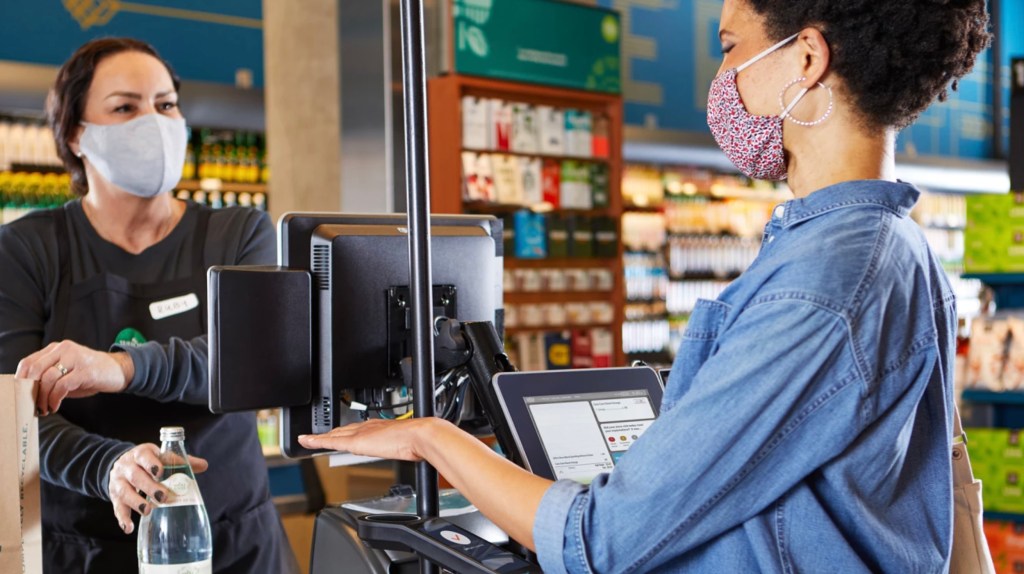Amazon’s “One” palm scanner payment technology will be launching at over 65 Whole Foods stores in California. This is the biggest rollout to date, with stores in Malibu, Montana Avenue, Santa Monica, Los Angeles, Orange County, Sacramento, the San Francisco Bay Area, and Santa Cruz receiving the tech that aims to modernize retail shopping.
When the checkout devices were first announced in 2020, Amazon One was available in Amazon Go stores, with an eventual expansion to Whole Foods stores in Austin, Seattle, Los Angeles, and New York City. Customers can also try checking out with their hand at the Amazon Style fashion store in Glendale, California, along with select Fresh and Go stores.
Amazon One is part of the company’s mission to use “contactless” technology that makes it faster to pay. The tech works like this: Users visit a kiosk or a point-of-sale station at participating locations to link their palm and payment card to the service. Then, all they have to do during the checkout process is hover their hand over a scanner to complete the transaction.
Amazon One creates palm signatures using machine learning to identify customers. While the kiosk takes a picture of a user’s palm, the company says it doesn’t store the image there but instead encrypts it and sends it to a server for matching.
As Amazon customers continue giving up their data for a more convenient shopping experience, concerns increase about privacy.
If you use Face ID or fingerprint scanners, you already use biometric data. However, it’s likely some users aren’t okay with the idea that Amazon One may allow the company to track your movements.
Even a group of U.S. senators expressed their concerns about the palm-scanning system. Senators Amy Klobuchar, Bill Cassidy and Jon Ossoff wrote in an open letter to Amazon chief executive Andy Jassy, “In contrast with biometric systems like Apple’s Face ID and Touch ID or Samsung Pass, which store biometric information on a user’s device, Amazon One reportedly uploads biometric information to the cloud, raising unique security risks.”
Tech and VC heavyweights join the Disrupt 2025 agenda
Netflix, ElevenLabs, Wayve, Sequoia Capital — just a few of the heavy hitters joining the Disrupt 2025 agenda. They’re here to deliver the insights that fuel startup growth and sharpen your edge. Don’t miss the 20th anniversary of TechCrunch Disrupt, and a chance to learn from the top voices in tech — grab your ticket now and save up to $675 before prices rise.
Tech and VC heavyweights join the Disrupt 2025 agenda
Netflix, ElevenLabs, Wayve, Sequoia Capital — just a few of the heavy hitters joining the Disrupt 2025 agenda. They’re here to deliver the insights that fuel startup growth and sharpen your edge. Don’t miss the 20th anniversary of TechCrunch Disrupt, and a chance to learn from the top voices in tech — grab your ticket now and save up to $675 before prices rise.
Last year, Amazon partnered with ticketing company AXS, with plans to implement Amazon One at Denver, Colorado’s Red Rocks Amphitheatre. Shortly after the announcement, hundreds of music fans, artists and human rights groups demanded Red Rocks drop the technology and ban all biometric surveillance tools like palm scans and facial recognition. They even signed a letter citing concerns about Amazon sharing palm print data with government agencies and potential hackers stealing the data from the cloud.
People aren’t wrong to be bothered by it, as Amazon has been known to store Alexa voice data. Also, Amazon sold biometric facial recognition services to United States law enforcement, and its Ring camera company works with police as well.
The company may have also found more data collection methods as it acquired iRobot last week, the smart room-mapping robot vacuum cleaner laden with advanced sensors.
Amazon expands its biometric-based Amazon One palm reader system to more retail stores


